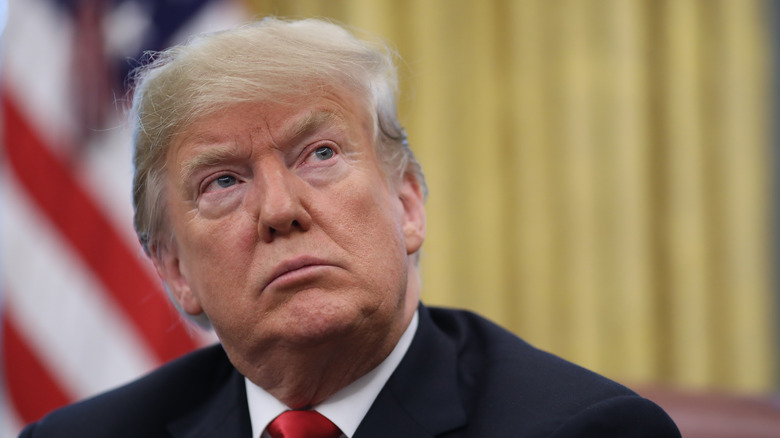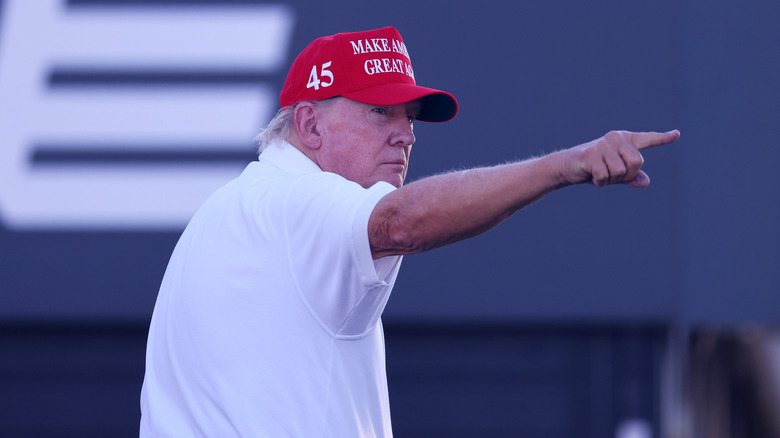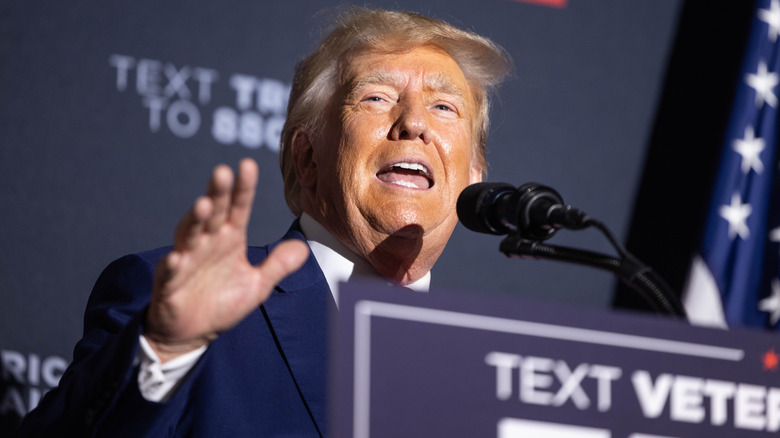Lawyer Tells Us What Could Happen If Donald Trump Violates Conditions Of His Bond
Donald Trump is currently facing 13 charges in the state of Georgia including criminal conspiracy, filing false documents, and criminal solicitation (via FOX Atlanta). The charges assert that the former president intentionally interfered with the democratic process by trying to change the results of the 2020 election.
On Aug. 24, 2023, Trump is expected to turn himself in to authorities in Fulton County, Georgia, at which time he will be released from custody on a $200,000 bond (per NBC News). As is always the case when a person is released on bond, there are conditions that Trump will need to abide by in order to remain out of custody on bond. In this case, Trump has been ordered by Fulton County Superior Court Judge Scott McAfee to "make no direct or indirect threat of any nature" against anyone involved in the case, including any co-defendants, witnesses, or the community as a whole.
The judge stated that actions that might be considered threatening include "but are not limited to posts on social media or reposts of posts made by another individual on social media." Considering Trump's history of unabashedly calling out organizations, institutions, and individuals he feels have done him wrong via his social media posts, this condition is drawing the most attention from those following the case. If Trump were to break this or any condition of his bail, what would happen to him? The List spoke with Joshua Ritter, criminal defense attorney and former Los Angeles County prosecutor, who explained the potential consequences.
The possible ramifications of violating bond
In the event that Judge McAfee finds that Trump has violated the conditions of his bond, it does not necessarily mean that his bond will be revoked or that Trump will go to prison. In fact, the ramifications would be up to McAfee and could vary from giving Trump a stern warning about future violations, fining him, or adding new, more restrictive conditions to his bond (via NBC News).
According to Joshua Ritter, a partner with El Dabe Ritter Trial Lawyers, "Any order a judge gives, there's the potential of some sanction if it's violated. Those sanctions can run the gamut, up to and including custody, especially if violated as a term of a bail condition."
That being said, Ritter doesn't think it's likely that the former president will be taken into custody. "That's not just because of the high profile of this case, but because there is a serious legal conflict arising here," he told The List. Considering Trump's 2024 presidential campaign and his four years in office as president of the United States, as Ritter noted, this situation is complicated and unprecedented.
Trump hopes to talk about his legal issues on the campaign trail
Although Donald Trump has been asked to "make no direct or indirect threat of any nature" per the conditions of his bond, the Republican candidate still hopes to talk about his legal woes this coming election season. In fact, he's likely planning to use them to his advantage.
According to Joshua Ritter, political speech is the most "sacrosanct" part of the First Amendment. "Trump's attorneys have already made the arguments publicly, and will probably make them formally in court, that not only should he be able to talk about the legal issues of this prosecution, but he has to address them as a political candidate because they have become a defining issue in his campaign," he told The List.
If Trump wants to uphold the conditions of his bail, he'll need to steer clear of statements that can be perceived as threats or intimidation. It's very evident that, when considering Trump's historical use of social media, this may prove more challenging than it looks. "A phrase like 'we're going to come after you' can be interpreted in many ways," Ritter said, adding that it may be a different story if Trump specifically threatens someone or directs his followers to do so. Ultimately, if Trump's lawyers argue that threatening posts are just "political rhetoric" it may not stand up well in court, Ritter said. The attorney also said Trump could also be in some pretty serious trouble "if he begins to divulge evidence that is under some sort of protective order from the court."


